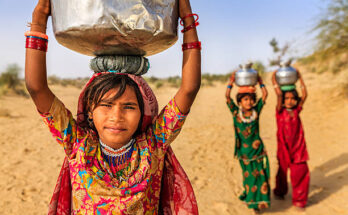Early childhood offers a critical window of opportunity to shape the trajectory of a child’s holistic development and build a foundation for their future. For children to achieve their full potential, as is their human right, they need health care and nutrition, protection from harm and a sense of security, opportunities for early learning, and responsive caregiving – like talking, singing and playing – with parents and caregivers who love them. All of this is needed to nourish developing brains and fuel growing bodies.

For many millions of the world’s most disadvantaged children – including children living in poverty or affected by conflict and crisis, children on the move, children belonging to communities facing discrimination, and children with disabilities – we are often missing this window of opportunity.
Science shows that life is a story for which the beginning sets the tone. That makes the early years of childhood a time of great opportunity, but also great risk.
Children’s brains are built, moment by moment, as they interact with their environments. In the first few years of life, more than one million neural connections are formed each second – a pace never repeated again. The quality of a child’s early experiences makes a critical difference as their brains develop, providing either strong or weak foundations for learning, health and behaviour throughout life.

Millions of children are not receiving the nutrition or health care they need, growing up exposed to violence, polluted environments and extreme stress. They miss out on opportunities to learn and are deprived of the stimulation that their developing brains need to thrive. Their parents and caregivers struggle to get the time, resources and services necessary to provide their children with nurturing care in these contexts.
When children miss out on this once-in-a-lifetime opportunity, they pay the price in lost potential – dying before they have a chance to grow up, or going through life with poor physical and mental health; struggling to learn and, later, to earn a living. And we all pay the price. Failing to give children the best start in life perpetuates cycles of poverty and disadvantage that can span generations, undermining the strength and stability of our societies.
When we give children the best start in life, the benefits are huge, for every child and for the societies we share. Providing early childhood development (ECD) interventions to all young children and families is one of the most powerful and cost-effective equalizers we have at our disposal, to ensure that the most vulnerable children can reach their full potential.
Because parents and caregivers are the most important providers of nurturing care in early childhood, UNICEF works to ensure they have the time, resources and services they need to provide it. We offer information and resources directly to parents, and also work with service providers and employers to offer support for parenting, from family-friendly workplaces and childcare, to child benefits for families and support for caregivers’ well-being.

The emotional, social and physical development of young children has a direct effect on their overall development and on the adult they will become. That is why understanding the need to invest in very young children is so important, so as to maximize their future well-being.
Neurological research shows that the early years play a key role in children’s brain development. Babies begin to learn about the world around them from a very early age – including during the prenatal, perinatal (immediately before and after birth) and postnatal period. Children’s early experiences – the bonds they form with their parents and their first learning experiences – deeply affect their future physical, cognitive, emotional and social development. Optimizing the early years of children’s lives is the best investment we can make as a society in ensuring their future success.


